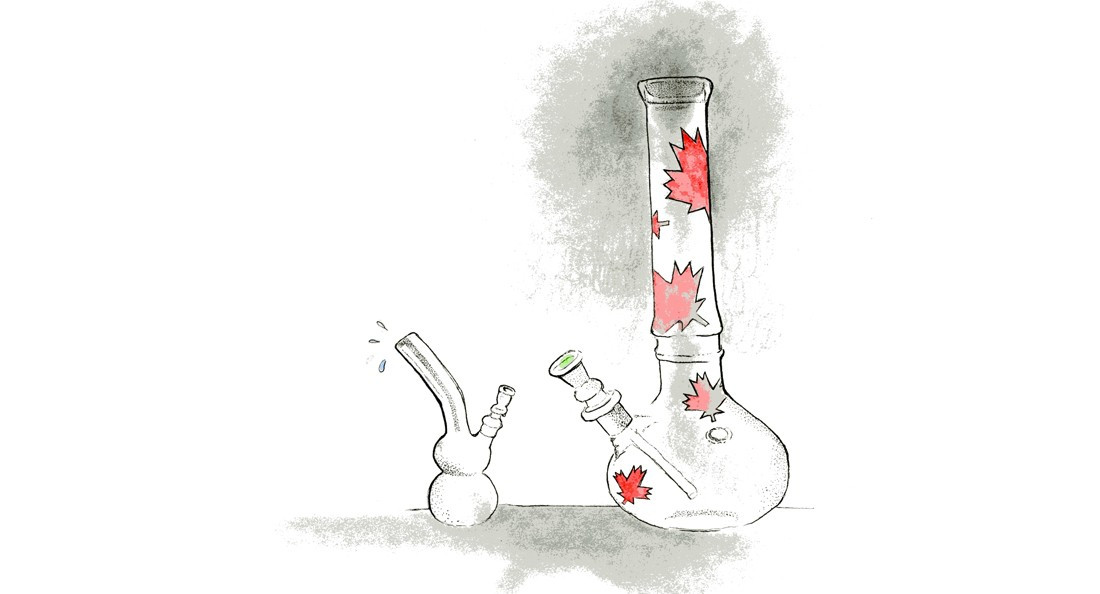The Stonedware Situation
Legalization from the hardware side
Many facets of cannabis legalization have been thoroughly explored, but less attention has been paid to the businesses that are integral to the industry and existed long before even medical cannabis was legal: smoke and head shops.
Smoke shops sell accessories for smoking, like pipes, rolling paper and grinders, which are explicitly for processing tobacco, but certain products would have been usable for cannabis as well.
Head shops tend to sell paraphernalia more directly related to drug consumption and culture, though both of these definitions are somewhat malleable depending on jurisdiction and store.
Ariel Glinter is the director of business development and regulatory compliance for The Joint Head Shop and Vape Shop. He says when the Cannabis Act came into effect, it had strict regulations for cannabis accessories and introduced provincial and federal inspectors. This meant smoke and head shops like The Joint really needed to stay on top of their compliance.
Glinter says when medicinal cannabis was legalized, people were “beginning to take an interest in various consumption methods, and over the last decade, parallel to the increased medical regime, the number and type of different cannabis accessories has virtually exploded.
“We really saw a giant shift towards different demographics across all ages that were using it medicinally,” Glinter says.
While Glinter says The Joint has “tried to make (itself) welcome to everybody and anybody, (and) haven’t tried to put (them)selves into a niche market so much in terms of high-end or low-end,” smoke and head shops aiming at more specific demographics have also been opening up.
Mackenzie Mroz, co-founder of The Cannabis Jar, says the one-year-old store carries “aesthetically inclined smoke wares and accessories” and provides cannabis education.
Mroz says with the growing cannabis-curious customer base, shops providing more niche products will find their client base.
“I think craft cannabis and micro-cultivators will play a big part in the industry in the next couple of years, almost like craft breweries,” Mroz says. “It seems people like to support small and local companies, so I think smaller cannabis companies who come out to and are able to supply products will definitely see an increase in (customers looking for) niche aesthetics, as well as handmade products in smokewares.”
A significant amount of cannabis production has been bought out by mega-corps Aurora and Canopy, and both Glinter and Mroz see the potential for that to be replicated on the accessories side of the industry.
“It is a worry to see this behemoth of an industry come up from nowhere,” Glinter says. Mroz says this is dependant on the “exit strategy” of small businesses, which may lead to niche brands being bought out. However, she ultimately believes small businesses will continue to be important.
As the consistent cannabis consumer base grows, Mroz says, “their ability to decipher between the niche market and local products (relative to those of larger companies) will grow as well.”
Glinter expects specialized products, particularly non-combustion accessories, which allow people to produce their own edibles, to become popular in the next year. Currently, the sale of edibles is illegal.
Mroz says not legalizing edibles was a wasted opportunity.
“Taking the time to educate people, especially beginners, would have been a great step to legalization,” she says, especially because legalization would have allowed for regulation of the products, which might have been a good way to prevent people from incorrectly dosing homemade edibles.
Published in Volume 73, Number 7 of The Uniter (October 25, 2018)







